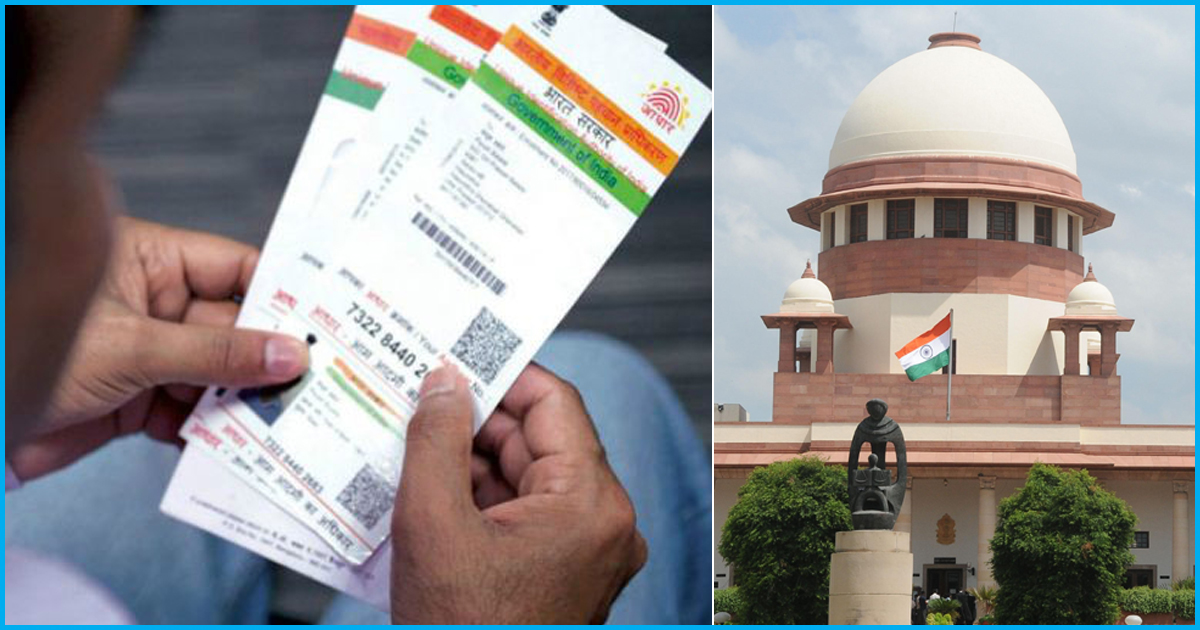The Supreme Court on September 26 gave its much-awaited judgement on the controversial issue of the constitutional validity of Aadhaar. Previously in January 2018, a five-judge bench of the apex court began a fresh hearing on the Aadhaar case which went on to become the second-longest running hearing in the history of the Supreme Court – spanning 38 working days and nearly five months.
While ‘Should Aadhaar be voluntary or mandatory?’ debate first sparked during the UPA-II government, it was most definitely accelerated under the current Modi Government. The Aadhaar litigation in the Supreme Court has now spanned over six years while at least 26 judges have heard this case at various points in time. While the Supreme Court had reserved its verdict earlier, the five-judge constitution bench headed by Chief Justice Dipak Misra has delivered a verdict on whether mandatory linking of Aadhaar with welfare schemes, bank accounts and PAN numbers violates the privacy of individuals. Reportedly, a total of 27 petitioners have, over the years challenged different aspects of Aadhaar in the court of law.
It should be noted that the Unique Identification Authority of India(UIDAI) is already in possession of biometric data of over a billion Indians. Petitioners have time and again claimed that the problems with the 12-digit numbers are manifold wherein security concerns and large-scale exclusion from welfare schemes have remained the biggest bone of contentions.
The Aadhaar case timeline
In 2012, a former High Court judge, K S Puttaswamy, filed a petition stating that Aadhaar violated fundamental rights like equality and privacy. Soon after more petitioners which included noted activists like Aruna Roy, Bezwada Wilson and Nikhil Dey also moved court. The apex court had then clubbed over 20 petitions. The petitions were heard for the first time in 2015. However, between 2012 and 2015, the SC gave a number of orders and directions to the Centre pertaining to the Aadhaar issue.
In 2013, an apex court bench passed an interim order stating that the UID number cannot be made mandatory for gas connections, vehicle registration, scholarships, marriage registration, salaries and provident fund. In March of 2014, the SC directed the Centre to withdraw any instructions which made Aadhaar mandatory. The court also directed that the Aadhaar data should not be shared with a third party without the consent of the cardholder.
In July 2015, an SC bench of Justices J Chelameswar, SA Bobde and C Nagappan began hearing the 2012 petitions. During the hearing, the judges held that the demands made by officials for Aadhaar card are in violation of the 2013 interim order. The then Attorney General Mukul Rohatgi had contested the SC order by stating that citizens did not have a fundamental right to privacy and added that right to privacy is not absolute and hence, subjected to restrictions in public interest. He also added that till the matter has been decided by the court, the petitions challenging the constitutional validity of Aadhaar could not be taken up.
In the same year, the SC extended the voluntary use of Aadhaar card to Mahatma Gandhi National Rural Employment Guarantee Act (MGNREGA), all types of pensions schemes, employee provident fund and the Prime Minister Jan Dhan Yojana.
In 2016, Congress leader Jairam Ramesh moved the court where he challenged the passage of Aadhaar (Targeted Delivery of Financial and other Subsidies, Benefits and Services) Act, 2016 as a Money Bill in May 2016. Furthermore, several petitions were also filed in the SC as the Central government started issuing notifications making Aadhaar mandatory for several more schemes under the Act.
The case went back and forth between the SC, the petitioners and the Central Government till, in 2017, a nine-judge bench decided that privacy is a fundamental right of the citizens. This paved the way for fresh hearings to start on the Aadhaar case, which was joined by many more petitioners, challenging different aspects of the case. Between 2017 and January 2018, the SC put an interim stay on the mandatory linking of Aadhaar for various government schemes and had also extended the date of mandatory Aadhaar linking date to December 31.
The fresh hearings on the clutches of petitions began in January, the verdict of which is finally out today, putting to rest a six-year-long fight against the 12-digit number.
Also Read: On Taxpayers’ Money, UIDAI Wants To Monitor & Frame Public Opinion On Aadhaar, Releases Tender











